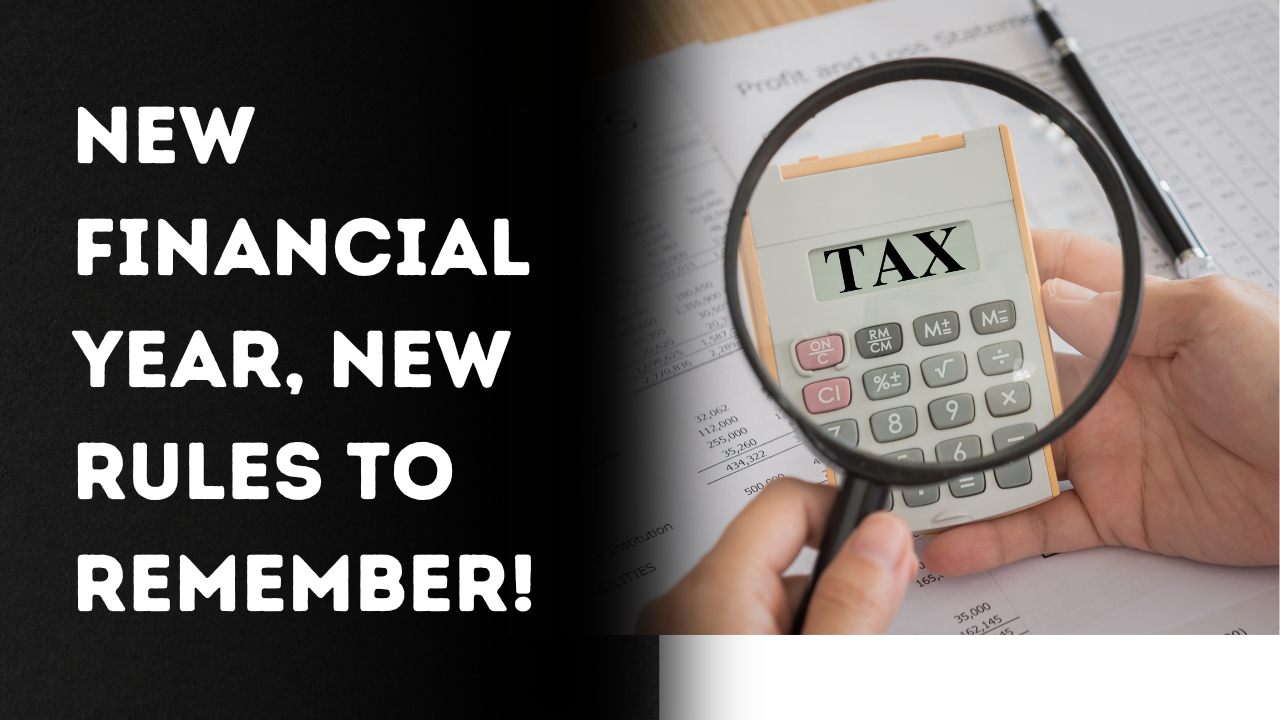New Financial Year, New Rules to Remember!
08 Apr 2024 4 mins Tax Planning

April has started and it’s time to start planning to file your Income Tax Return (ITR) according
to the latest income tax rules and save some money as the new year resolution. There are
no changes in this year’s income tax rules as confirmed by the Ministry of Finance and below
are the things you have to keep in mind for choosing the suitable of the 2 options: old tax
regime and new tax regime.
Default Option:
When filing for income tax, the default option is the new tax regime. If you wish to utilise the
old regime, you have to file the income tax before the deadline ends on July 31st. If the ITR is
filed between August and December, the rules from the new regime will be considered. So,
it is imperative to let your employer know of the tax regime you are choosing and file the ITR
before the deadline.
Tax slabs:
The new tax regime was introduced under 115BAC(1A) in the Finance Act 2023 to make
filing ITR easier and more convenient with the changing demographics. The most important
criterion we chose for the tax regime is how much income tax am I obliged to pay? Let the
table below help you choose that:
Deduction and Exemptions:
Though the new tax regime looks attractive from the initial look in terms of the payables, the
old regime becomes attractive because of the deductions and tax exemptions.
The old tax regime offers some deductions and exemptions such as:
• Premium paid for health insurance under section 80D
• Additional investment National Pension System (NPS) up to 50,000 under section
80CCD
• Deduction on interest paid on home loans and educational loans
• Tax exemption on house rent allowance (HRA) and Leave Travel Allowance (LTA)
But fret not new regime enthusiasts! Though available to the old regime as well, the new tax
regime can utilise the following benefits:• Standard deduction of 50,000 from salary and pension income
• Deduction for employer’s contribution to NPS account under Section 80CCD (2).
• Family pensioners are eligible for a standard deduction of 15,000 under the new
regime.
Why New Tax Regime?
Your parents may continue with the old tax regime and may suggest it to you as well. But it's
up to you, with all these facilities to understand both regimes and make an appropriate
decision. You have the following benefits from the new tax regime:
• Simplified tax planning without keeping records of travel tickets and receipts of rent.
• The basic exemption limit of 3 lakhs (raised from Rs. 2.5lakhs), which applies to all
individuals
• Surcharge reduced from 37% to 25% for individuals having income exceeding Rs. 5
crores.
• The rebate limit increased to Rs. 25,000 for incomes up to Rs. 7 lakhs.
Why Old Tax regime?
You hear out your parents’ arguments for the old tax regime, which may be as below:
• Deduction of up to Rs. 1.5 lakh for eligible investment under Section 80C which is
considerably useful for individuals in the highest tax brackets of the old tax regime.
• Deduction on the premium paid for insurance policy up to Rs. 25,000 for insurance
under the age of 60 and Rs. 50,000 for insurance above the age of 60.
• Deduction up to 10% of basic salary in contribution to NPS, reducing taxable income.
• Individuals receiving HRA can utilise the old tax regime to receive deductions on HRA.
• Claim up to Rs. 2 lakh deduction each financial year on the interest paid on home
loan under section 24 (b).
There are many other exemptions and deductions under the old tax regime such as
deduction for education loan interest and donations paid to eligible institutions under
section 80G.
The basic exemption limit for individuals in a financial year varies for the age brackets under
this regime:
• Below 60 years of age: up to 2.5 lakhs exemption
• Senior citizens between 60 and 80 years of age: up to Rs. 3 lakhs exemption
• For senior citizens above 80 years of age: up to Rs. 5 lakhs exemption.
Choosing between the old and new tax regime depends on your situation. Old regime is
beneficial who can opt for the numerous deductions under it. If not, the new tax regime
feels more apt.
Though you can switch between old and new regimes, there are restrictions on the
frequency of change. Individuals receiving income from businesses and professions who have chosen to opt out of the new tax regime can only exercise the option of going back to
the new regime only once.
Happy new financial year and celebrate the new year with great savings!